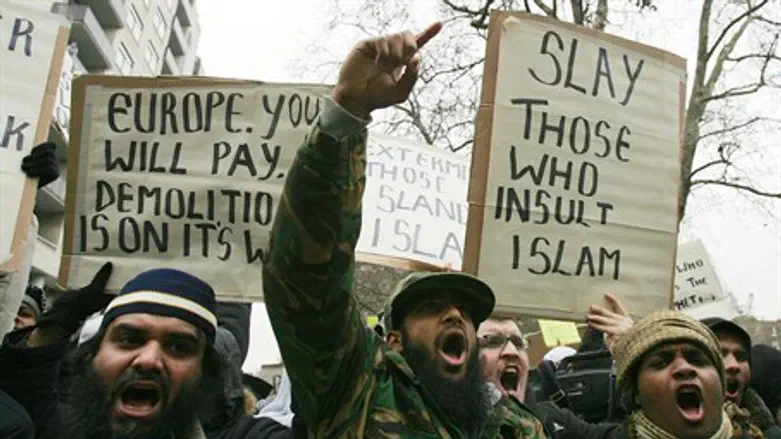
The British government has introduced new measures aimed at tackling Islamist extremism, including legislation to silence Muslim "hate-preachers" who facilitate radicalization and encourage terrorism.
The legislation was drawn up following the brutal murder of an off-duty British soldier, Drummer Lee Rigbey by two Muslim extremists. Rigbey was killed in broad daylight on a street in Woolwich, in southeast London, after Muslim converts Michael Adebolajo, 28, and Michael Adebowale, 22, ran him over in their car and then butchered him with a meat cleaver.
The measures will include expanding the powers of independent watchdogs to enable them to shut down charities which serve as fronts for extremist organizations, as well as a proposal for new internet filters to block access to extremist material, similar to those already employed by users to block online pornography, according to the Daily Mail.
Authorities will also be able to issue distancing orders against individuals suspected of encouraging extremism, preventing them from accessing places like mosques and Islamic centers.
The government legislation will be based on a new official definition of "extremism" which specifically includes "Islamist extremism". The previous official definition did not single out Islamism, instead referring to a more general "opposition to fundamental British values, including democracy, the rule of law, individual liberty and mutual respect and tolerance for different faiths and beliefs" as well as "calls for the death of members of our armed forces."
"This summer we saw events that shocked the nation with the horrific killing of Drummer Lee Rigby in Woolwich and murder of Mohammed Saleem in Birmingham," said Cameron in a statement to journalists during his visit to China. "These tragedies were a wake-up call for government and wider society to take action to confront extremism in all its forms, whether in our communities, schools, jails, Islamic centers or universities."
82 year-old Mohammed Saleem was murdered by a Ukranian student on his way back from his local mosque. Pavlo Lapshyn admitted to killing Saleem and said he was motivated by racism, as his victim "was not white".
Cameron added that tackling extremism "is not something we should be afraid to address for fear of cultural sensitivities," in a veiled reference to criticism leveled at successive British governments - including his own - that authorities were not taking a firm enough hand against Islamism out of fear of being labeled "Islamophobic".
Those comments come less than two weeks after a British anti-extremism group revealed how French intelligence agents were so frustrated by the lack of action by their British counterparts against Islamist terrorism that they planned to "take matters into their own hands" and assassinate a leading extremist Muslim cleric.
But Cameron rejected criticism of his government's handling of the issue so far, saying that "We have already put in place some of the toughest terrorism prevention controls in the democratic world," although he accepted that "we must work harder to defeat the radical views which lead some people to embrace violence."
At the same time he admitted that "There are just too many people who have been radicalized at Islamic centers, who have been in contact with extremist preachers, who have come across material on the internet who haven’t been sufficiently challenged."
According to the British PM, the new measures will also help those institutions who "have wanted to get rid of radicalizers but haven’t had the means to do so."